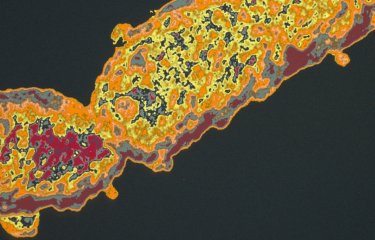Whooping cough or pertussis is still the primary cause of death by bacterial infection in infants less than two months old, in France despite general vaccination. The endemicity of this infection is observed in many vaccinated countries. The agent of the disease, a bacterium, was isolated by the Pasteur scientist, Jules Bordet(1) in 1906. For this centenial, the Institut Pasteur is co-organising and hosting from November 7 to 10 the 8th International Symposiul on Bordetella: Saga of the genus Bordetella, 1906-2006. This is an occasion to review the pertussis situation today as well as the research currently underway.
Press release
Paris, october 26, 2006
At the present time, whooping cough is responsible for 40-60 million cases per year throughout the world and 300,000 deaths, mainly in developing countries. Its incidence has greatly diminished in countries that have introduced widespread vaccination. But over the past ten years in these countries, a change in the transmission of the disease has been observed, due to the lack of a vaccine booster after 18 months of age. This transmission no longer takes place from child to child as in the pre-vaccination period, but from adolescents and adults (in whom the protection acquired by vaccination has disappeared) to new-borns. For this reason, a late booster at 11-13 years of age has been recommended since 1998 in France and since 2004 for young parents, at-risk adults, and health care workers in contact with new-borns. These boosters could be introduced thanks to the fact that sub-unit or acellular vaccines (i.e. those composed of inactivated bacterial proteins) appropriate to infants and also to adolescents or adults have been developed and are now available. Other European countries, in the light of a definite resurgence of whooping cough, have since issued similar recommendations.
Today, the incidence of the disease in unvaccinated infants (less than three months of age) remains high in France- 266 cases per 100,000 in 2004(2). The incidence in adults was 887 cases per 100,000, according to a survey conducted in 2002. One hundred years after the discovery of the agent of the disease by the Pasteur scientist, Jules Bordet, whooping cough still causes several deaths every year in France, generally in infants infected by their parents.
Hence the importance of maintaining epidemiological monitoring over the area, carried out by the "RENACOQ" network, which was created by the Ministry of Health and is composed of hospital bacteriologists and paediatricians; as well as the National Reference Centre for whooping cough and other bordetelloses, located at the Institut Pasteur and responsible for the microbiological side of the surveillance.
At the same time, studies on new vaccines must be conducted: although it is known that "sub-unit" vaccines have fewer side effects than "whole-cell" vaccines used previously, the duration of the immunity they confer is not yet known, an issue that is crucial in order to adopt optimal vaccine strategies in future.
The Institut Pasteur’s Molecular Prevention and Therapy of Human Diseases research unit, directed by Nicole Guiso, which houses the NRC for whooping cough and other bordetelloses, is conducting research to this end, in collaboration with various European nations.
Involved in the microbiological and clinical surveillance of whooping cough, in France as in other countries (with the Instituts Pasteur located in Saint Petersburg, Alger, Tunis, and Tehran), and in the study of the duration of immunity induced by the different pertussis vaccines, this research laboratory is also monitoring other bordetelloses. Indeed, it is necessary to check whether their evolution has been modified by vaccination against pertussis, with the possible risk of the resurgence of some pathologies: for example, parapertussis, due to Bordetella parapertussis, which is not currently a problem in France, but persists in Eastern countries and Finland; and bordetelloses due to the bronchiseptica species, which affects immunosuppressed individuals.
Thanks to the genomic sequencing of the different Bordetella species carried out in recent years at the Sanger Centre (United Kingdom), Pasteur researchers are working to develop effective diagnostic tests to improve the necessary surveillance of the different bordetelloses. They are also studying the evolution, over time and in different ecosystems, of these bacterial species, developing precise analytical techniques from the sequences of their genomes.
Finally, Nicole Guiso’s team is currently evaluating new therapeutic tools against whooping cough, based on the use of specific antibodies of the different Bordetella pertussis toxins.
These studies are facilitated by the existence of an animal model, developed in recently by Institut Pasteur researchers, and already used within surveys co-ordinated by the World Health Organisation for evaluating sub-unit vaccines.
(1) Bordet J., Gengou O. The Microbe of Whooping Cough. Annals of the Institut Pasteur, 1906; Volume 20: 731-741.
(2) Renacoq : Surveillance of Whooping Cough in the Hospital in 2004. BEH no. 17, April 2006.
Eighth International Symposium: Saga of the genus Bordetella, 1906-2006
Institut Pasteur - From Tuesday, November 7 to Friday, November 10, 2006
The symposium will focus on presentations on the history, genetics, biology, pathogenicity, and control of infections caused by the various bordetelloses. All details on this symposium are at:
http://www.pasteur.fr/infosci/conf/sb/8thBordetellae/
Please register with the Press Office if you wish to attend.
Contact persons
Institut Pasteur
Nadine Peyrolo ou Corinne Jamma
+33 (0) 1 40 61 33 41 - cjamma@pasteur



